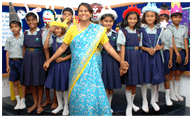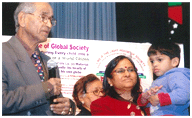With so many schools already in the city and especially in Indira Nagar, why do we need another school? What is different about this school? What are the costs? These are some of the questions that loom large as we focus on the new school, the NGS.
Educating a child in the 21st century is the most complex task of all. We need to be humble about what we know and think afresh about education's goals and every child's potential to excel and to contribute. The way we conduct education needs to be reconsidered dramatically in this new century. NGS is a modest attempt in this direction,” says Dr Gandhi, the NGS Founder.

Sunita Gandhi started her first school at the age of 14 for the underprivileged children in her neighbourhood. After completing Class X, she moved to the UK to do A-Levels following which Sunita received three merit based scholarships to undertake her doctorate programme in Physics at Cambridge University. Subsequently, she founded schools in Prague, the Czech Republic and in Hafnarfjordur, Iceland, where she began in 2000 to experiment with and pilot her Global Education Model of Schooling, or the NGS “Dynamic”. In the 26 years abroad, Sunita has lived in the UK, USA, the Czech Republic and Iceland and carried out educational projects and traveled to 34 countries.

She is the daughter of Mr and Mrs Jagdish and Bharti Gandhi, founders of City Montessori School (CMS) to whom she has dedicated her new endeavour, the NGS. She credits much of her own learning to the discussions and insights gained since early childhood in the home environment where breakfast, lunch and dinner talk was about education, and to the on-going engagement with schooling throughout her life. Sunita has also had much opportunity for working on education worldwide, starting with tutoring students in England as a student herself, to setting up her own schools and assisting others on three continents, to providing teacher training and creating assessments and materials, to her work in the Indian villages which continues to the present.
After her Ph.D. and a year plus as a post doctorate fellow at the Lawrence Berkeley Laboratories in California, Sunita joined the World Bank in Washington, DC. Within a year, she was able to qualify the World Bank's toughest international competition to join the Young Professionals Programme as an Economist. Eight years into her work, Sunita Gandhi received the 'Most Outstanding Contribution to Development Award' by the president of the World Bank for her 'participatory' work in development in Morocco. Her work focused on education and development in several countries.
In 2004, when her parents invited her back, Sunita moved to Lucknow and supported the academic work of CMS. The work on NGS began in July 2006 and its first full session began in April 2007. Together with a center for teacher's training, Sunita Gandhi has established the NGS to serve as a laboratory for creative work in education.

The Global Education Model of Schooling, or the NGS “Dynamic” Process has been an on-going endeavour since 2000 in Iceland, and subsequently in India and the UK. The NGS “Dynamic” Assessments, the NGS Personalised Study Materials (PerBOOKS), the MAXIM ClassBOOKS for the Pre-K-VIII students along with the TargetPLUS MOCKS and the Sure Success Series for X & XII students are inspiring students to compete with themselves, not others.
Though NGS “Dynamic” is based on her own ideas in education, Dr Gandhi acknowledges the enormous contribution of over 200 individuals on three continents who have helped her in the mission as consultants, graphic artists, programmers, technical experts, artists, history of mathematics experts, office and support staff. She also acknowledges the tremendous role played out by the principals and teachers who have tried out these methods and implemented pilots of NGS “Dynamic” in Iceland, UK and India. She also credits her work to mentors Dr Robert J Saunders, her former boss at the World Bank with whom she co-founded the Council for Global Education, USA (www.globaleducation.org), Mr Bodvar Jonsson, with whom she co-founded Islensku menntasamtokin (The Education Society of Iceland; www.ims.is) and to Steinnun Gudnadottir, a mother of four in Iceland, a person of great passion and commitment, among others in India and overseas.
Traditional 'Summative Evaluation' limits human potential to excel and compete with its own self. Whether offered as grades or marks, summative information invariably compares students with one another and does not provide sufficient basis for creating intrinsic motivation. The vast majority of our children feel lost in such a system. They don't feel they are good enough if they are not in the top 10-20% of a class. Besides broadening the definition of what it means to be educated and to be successful, NGS “Dynamic” is a new way of thinking about education and assessments based on the premise of competition with oneself. These are especially important goals to implement for the pre-primary and primary classes, to preserve the self-esteem and confidence of each child, to make every child feel special and to create an intrinsic desire to excel in all things. The Four Building Blocks of Education as promoted by the Council for Global Education, USA (www.globaleducation.org) are the most important underpinnings of an education in the 21st century: Universal Values, Global Understanding, Excellence in All Things and Service to Humanity.
Many schools worldwide are already working to these goals. We invite other similar-minded individuals and innovators everywhere to join forces in this important mission to revamp education and make it more meaningful in the 21st century.
The process of education must endorse the human spirit and bring out the NGS latent in each child. Indeed, every child is a GEM!
Baha’i writings say: “Man is a mine rich in gems of inestimable value. Education can, alone, cause it to reveal its treasures and benefit mankind therefrom.”
The role of education is to bring out the gems latent within each child —to polish and help refine each rock until it shines like a GEM!
each child against his own potential with diagnostic and formative tools. CMS provides four such reports to its students each year free of charge
personalised workbooks and textbooks that help each child excel
for goal-setting, planning and time-management
that empower teachers to be effective in imparting education

NGS has been implemented for the children of CMS in classes I through V, in the core subjects of English and Mathematics.
Copyright © 2012 Nurture Global School All rights reserved.